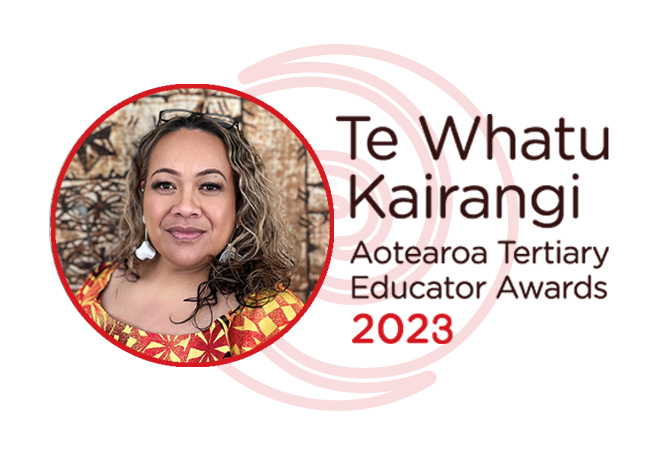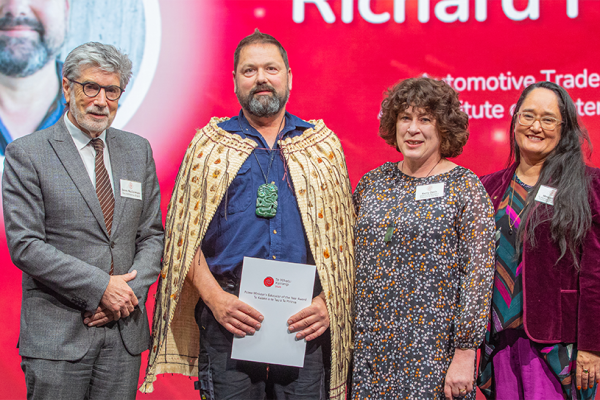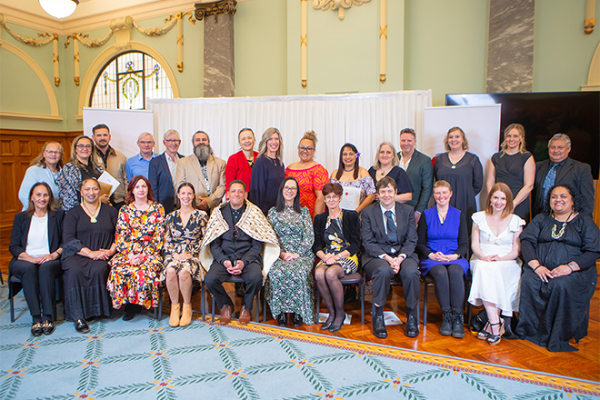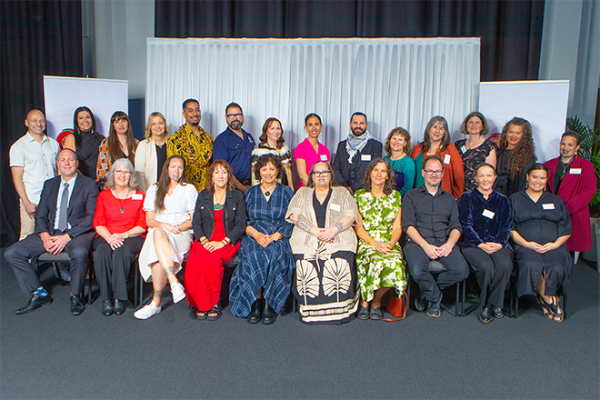Filoi Genevieve Togiaso
Powerful educator and leader of Pacific learners
Le Moana Mua Award
Head of Department for Health Practice | Ara Institute of Canterbury | Te Pūkenga
Watch Filoi Genevieve Togiaso's Teaching profile video
"Tēnā koe, Ou te fa’atalofa atu, ma le agaga fa’aaloalo, mālō le soifua maua, ma le lagi e mama. My name is Filoi Genevieve Taula-Togiaso, New Zealand born Samoan. My father is Taula from the village of Taga, my mother Apaau from the village of Avao in Savaii, Samoa. I was born and raised in Christchurch and I am a single mother of 4 children.”
Filoi is a Registered Nurse with 30 years’ experience. She did her training at CPIT in 1993, now known as Ara Institute of Canterbury Te Pūkenga. In 2013, she worked as a full-time lecturer in the Bachelor of Nursing for one year before moving overseas with her family. She returned in January 2020 to be close to her aging parents and continue her own academic journey. She taught the Bachelor of Nursing and was appointed the Pacific Academic Lead. In March 2022, Filoi was seconded to the position of Head of Department for Health Practice at Ara Te Pūkenga, which is her current role.
Filoi has qualifications in both health and community leadership with extensive knowledge and experience in both clinical and organisational development, leadership, and governance. She completed her Certificate in Adult Teaching in 2021 and graduated in 2023 with her Masters in Professional Practice (Leadership).
Filoi’s portfolio provided some wonderful insights to her practice as a Pacific Educator and leader within the Tertiary sector and how those practices link to the 10 habits of phenomenal educators for Pacific learners.
The Fenua, or pedagogy of reflection, aligns well with Filoi’s practice as a registered nurse. Reflecting on her practice has always enabled Filoi the opportunity to further grow and challenge the status quo; as an educator she feels it is important to learn and identify areas of improvement and to learn from experiences.
Moana – know your Pacific learner and context. Filoi aims to be a transformative educator by gaining a deeper understanding of Pacific learners. She thinks it is essential that educators understand this diversity and respect it.
An important part of the process of getting to know Pacific learners at the beginning of their courses are introductions. This helps Filoi to understand and find connection with the ākonga but also for ākonga to get to know their fellow students. Everyone has to come to the front of the room, write their full name on the white board, then explain who they are named after, how they got their name, their links to the land, and why they chose nursing. Filoi starts with writing her name and then goes on to share her 30 year nursing journey and experience in nurse education.
This experience can be challenging, and some ākonga choose to disclose little about themselves. Filoi facilitates the session to ensure that everyone taking part feels safe and has adopted this process into many of her practices, including working with her leadership team.
Vaka – educate with phenomenal Pacific-centric methods. Filoi’s learning journey has evolved considerably over many years. She struggled immensely during her training as a Registered Nurse in the early 1990s. There was little or no support for Pacific ākonga. She struggled as a New Zealand-born Samoan during the period after 1992 when Cultural Safety was introduced into the nursing curriculum and attracted negative media attention. The pressure and uncertainty led her to conform and leave who she was as a Samoan at the door in order to complete and gain her qualification. Filoi completed her studies feeling very ill-prepared and lacking confidence.
However, once Filoi began her nursing career she found several opportunities that led to her working with the Pacific community. She began working for a Pacific provider where she eventually found her voice and confidence as a Pacific nurse. Coming into education reminded her of her of her previous experiences and motivated her to ensure her teaching practices are Pacific-centric.
Le teu le Va: Build teaching and learning relationships with Pacific learners. Filoi is very familiar with the Samoan protocol, teu le va (reciprocal relationships), which means to take care, nurture, and value (teu) the spaces (va); the relational space brings together connections between families and communities.
Establishing this connection and relationship is key for the success of the Pacific ākonga. Therefore, Filoi actively strives to ensure that the introduction practice enables her to build trust and credibility with them. It is also important for her to be visible at Pacific-specific ākonga events, supporting her ākonga; showing she is approachable, and that being seen will help remove any barriers.
Ola: Develop phenomenal practices. There are many evidence-based practices that enable and enhance learning for ākonga success including opportunities such as group work, discussions, presentations, and drop-in sessions specifically for Pacific ākonga to unpack and understand assessment questions. She observed that ākonga grades improved as they progressed through the course.
Teatea: Instil motivation and good work habits. Filoi helps learners to make the transition to tertiary education as empowering as possible. She focuses on the strengths that the learner brings to the classroom and builds on these strengths. She helps motivate and nurture her learners and helps them visualise what is possible for their future. She supports her learners to realise their abilities and strengths and how these can be used in their lives.
Aupuru: Cultivate creativity and enthusiasm. In the foundation course Professional Responsibility, the topic of policy and legislation is a difficult one for ākonga to understand. Through story telling, Filoi is able to give ākonga insight into the reasons why this paper is an important component of their study. Her teaching engages and stimulates ākonga to explore the subject.
Putuputu: Construct a Pacific learning community. The building of community fosters learners’ cultural identity and encourages a sense of belonging. Filoi is inspired by her Pacific ākonga and she has a great desire to see them succeed. Understanding their needs and actively motivating them to continue to try hard, are great enablers of success.
Arofa: Enable mentoring to be a natural part of your teaching. Filoi uses mentoring to foster the growth and development of her students. Her mentoring acts as a catalyst for improving Pacific ākonga success. She notes that it is also important that ākonga remain linked to their aiga and communities.
Ti’ama: Deconstruct and emancipate your Pacific learners’ experiences. Filoi believes it is important to focus on what works for learners, rather than on what they do not have. She enables Pacific ākonga to be involved in activities, advocates for Pacific ākonga with colleagues and normalises aiga obligations to ensure they are not disadvantaged because of who they are. She also works very closely with the institution’s Pacific team.
Filoi says, “I have learnt and understand my learning style which has enabled me to be an effective educator and leader. The way we see and engage with the world is what influences my pedagogical practice as a Pacific person, teaching and linking theory to my experiences through story telling enables Pacific ākonga to visualise and link to their own similar experiences.”



